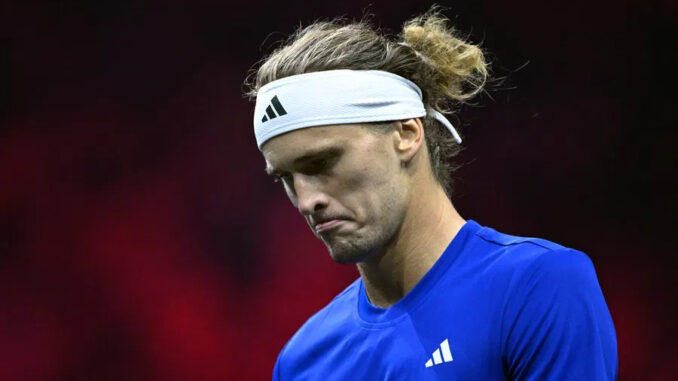
In a stunning upset at Wimbledon 2025, Alexander Zverev, a former US Open finalist and World No. 3, suffered a first-round exit that left the tennis world reeling. The 28-year-old German fell to France’s Arthur Rinderknech, ranked No. 72, in a grueling five-set battle, marking his earliest Grand Slam departure since 2019. The loss itself was a shock, but it was Zverev’s raw post-match press conference that sparked concern from tennis legend Boris Becker, who revealed what he saw as a critical mistake: Zverev’s candid admission of his mental health struggles. Becker, a six-time Grand Slam champion, cautioned that such openness at a vulnerable moment could have lasting repercussions, offering a poignant critique of his compatriot’s approach.
Zverev’s defeat on the grass courts of the All England Club was a stark contrast to his stellar 2025 season, which included titles in Stuttgart and Halle and a runner-up finish at the Australian Open. Facing Rinderknech, a player he was expected to dominate, Zverev battled through a 6-4, 4-6, 6-3, 4-6, 7-5 marathon but faltered in key moments, unable to match his opponent’s resilience. The loss stung, as Zverev had arrived at Wimbledon with high expectations, having reached the semifinals or better at three of the last four majors. Yet, it was his emotional press conference that drew Becker’s attention, where Zverev laid bare his inner turmoil. “I’ve never felt this empty before,” he confessed, adding, “I would say more mental, probably. It’s funny, I feel very alone out there at times. I struggle mentally.”
Becker, who has long viewed Zverev as a “sporting adopted son,” was deeply moved by the honesty, admitting on his Becker Petkovic tennis podcast, “I watched the press conference live and I cried.” The three-time Wimbledon champion found Zverev’s vulnerability “incredibly sad,” noting, “A person opened up and said, ‘I have problems, I have mental problems, help me. I don’t have anyone around me except my daughter, who is four years old, with whom I like to spend time, where I laugh and smile.’” However, Becker believed Zverev’s candor was a misstep. “If I had been his coach, I would have advised him not to reveal such information about his mental state at the Wimbledon press conference,” Becker said. “Ideally, we do not confide when we are eliminated in the first round of a Grand Slam tournament.”
Zverev’s openness highlighted a broader struggle. Despite his 0-3 record in Grand Slam finals, including a heartbreaking loss to Dominic Thiem at the 2020 US Open, Zverev has been a consistent top-tier contender. His 2025 season boasted a 68% win rate and a career-high 22 aces in a single match at Roland Garros. Yet, his admission of feeling unmotivated, even after victories, raised alarms. “Even when I’m winning, like in Stuttgart or Halle, it’s not necessarily a feeling that I used to get where I was happy, over the moon,” he said. Becker, who reached out to Zverev post-match to check on him, expressed genuine worry, stating, “For the first time, I’m a little worried about his mental health.”
Becker’s critique also touched on Zverev’s coaching setup, a recurring point of contention. Coached primarily by his father, Alexander Sr., with occasional input from his brother Mischa, Zverev has resisted major changes to his team, despite Becker’s earlier suggestion for a revamp. “It wasn’t the first time Becker had something to say about Zverev’s team,” noted observers, recalling Becker’s advice for a coaching overhaul that Zverev dismissed. The German’s loyalty to his family-led support system has been both a strength and a point of scrutiny, especially as younger stars like Jannik Sinner and Carlos Alcaraz have surged past him, claiming World No. 1 and multiple Grand Slam titles.
The Wimbledon setback adds pressure to Zverev’s quest for a maiden major title, a goal that has eluded him despite 23 career ATP titles. His raw honesty, while humanizing, risks exposing vulnerabilities to rivals, as Becker cautioned. Yet, Zverev’s willingness to share his struggles reflects a growing openness in tennis about mental health, following in the footsteps of players like Naomi Osaka. As he prepares for the US Open, where he reached the final in 2020, Zverev faces a pivotal moment to regroup. Becker’s concern underscores the delicate balance between vulnerability and resilience in a sport that demands both. With his daughter as his anchor and a supportive tennis community behind him, Zverev’s next steps will determine whether he can reclaim his spark and fulfill his Grand Slam destiny.
Leave a Reply